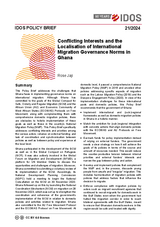Policy Brief
Conflicting interests and the localisation of international migration governance norms in Ghana
Jaji, RosePolicy Brief (21/2024)
Bonn: German Institute of Development and Sustainability (IDOS)
DOI: https://doi.org/10.23661/ipb21.2024
This Policy Brief addresses the challenges that Ghana faces in implementing governance norms on international migration. Although Ghana has committed to the goals of the Global Compact for Safe, Orderly and Regular Migration (GCM) and the African Union (AU) and Economic Community of West African States (ECOWAS) Protocols on Free Movement, along with complementing them with comprehensive domestic migration policies, there are obstacles to holistic implementation of these goals as well as those in the country’s National Migration Policy (NMP). This Policy Brief specifically addresses conflicting interests and priorities among the various actors; reliance on external funding; and lack of coordination and synchronisation between policies as well as between policy and experience at the local level.
Ghana participated in the development of the GCM as well as in the Global Compact on Refugees (GCR). It was also actively involved in the Global Forum on Migration and Development (GFMD), a platform for UN Member States to discuss the opportunities and challenges of migration. Moreover, Ghana committed to submitting a voluntary review of its implementation of the GCM. Accordingly, its National Development Planning Commission (NDPC) held a meeting to begin the National Consultation on the GCM on 30 November 2020. Ghana followed up on this by launching the National Coordination Mechanism (NCM) on migration on 28 November 2023, which was set up to strengthen the coordination and coherence of the government’s implementation of the GCM in relation to domestic policies and activities related to migration. Ghana also committed to the AU Free Movement Protocol and the ECOWAS Protocol on Free Movement. At domestic level, it passed a comprehensive National Migration Policy (NMP) in 2016 and unveiled other policies addressing specific aspects of migration such as the Labour Migration Policy (2019) and the Diaspora Engagement Policy (2020). In view of the implementation challenges for these international pacts and domestic policies, this Policy Brief recommends that the government of Ghana:
- Implement international and (sub-)regional frameworks as well as domestic migration policies in Ghana in a holistic manner.
- Match the ambition for (sub-)regional integration with concrete actions that align domestic policies with the ECOWAS and AU Protocols on Free Movement.
- Earmark funds for policy implementation instead of relying on external funders. The government needs a clear strategy on how it will achieve the goals of its policies in terms of the source and amount of resources needed. This would reduce the counter-productive tension between internal priorities and external funders’ interests and narrow the gap between policy and action.
- Develop and implement policies that complement the NMP and, in the process, dissuade young people from unsafe and “irregular” migration. This includes harmonisation of migration policies with policies that address factors that influence the decision to migrate.
- Enforce compliance with migration policies by actors such as migrant recruitment agencies that continued to recruit migrants for domestic work in the Gulf States even when the government had halted this migration corridor in order to reach bilateral agreements with the Gulf States, meant to ensure that Ghanaian domestic workers in this region would be safe and treated with dignity.
Kontakt
Cornelia Hornschild
Koordinatorin Publikationen
E-Mail Cornelia.Hornschild@idos-research.de
Telefon +49 (0)228 94927-135
Fax +49 (0)228 94927-130
Alexandra Fante
Bibliothekarin/Open Access-Koordinatorin
E-Mail Alexandra.Fante@idos-research.de
Telefon +49 (0)228 94927-321
Fax +49 (0)228 94927-130




